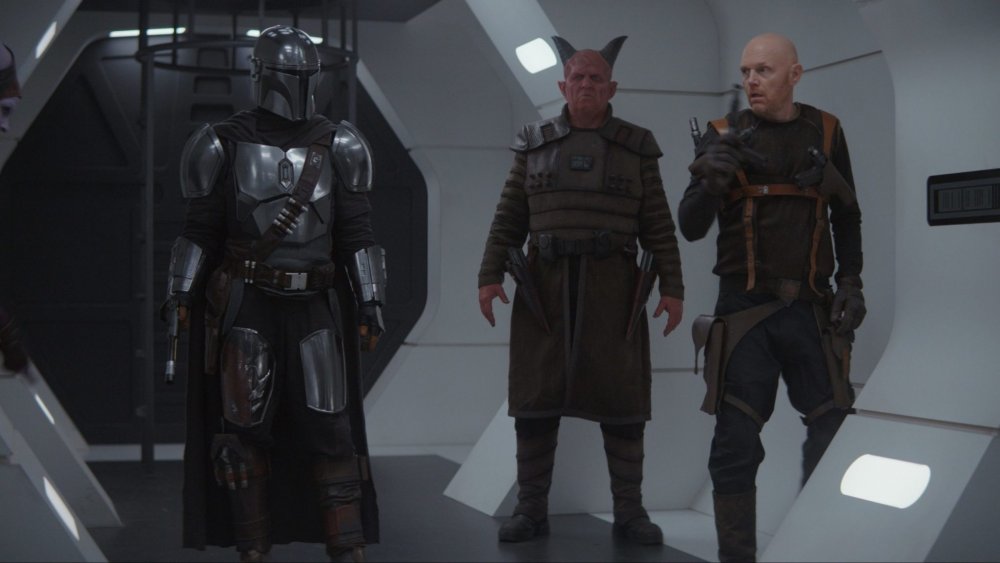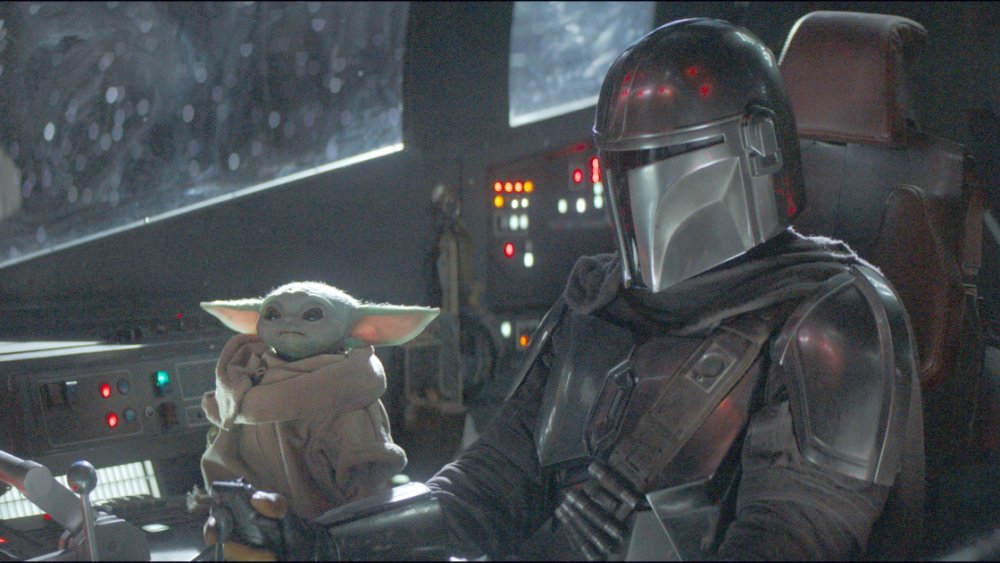The Ending Of The Mandalorian Chapter 6 Explained
Style, form, and backstabbing wholesomeness make for the best action buffet yet in The Mandalorian chapter 6. Mando shines in this long, slow unfurling of more of his elusive backstory, using all his martial talents to dig himself back out from the situations his charming himbo nature gets him into. After the events of chapter 5 on Tatooine, Mando is still desperate for cash, and in that desperation bites off almost more than he can chew on a prison break mission. He is definitely the honorable man Qin suggests he is, but that doesn't mean he can't engage in a touch of double-cross to keep himself alive.
In the episode's final moments, we realize that Mando took the Republic distress signal from the prison ship — after turning it off to give himself all the time in the world to lock up his would-be mercenary teammates and escape — and secreted it into Qin's belt to draw Republic fighters back to the mercenary base and destroy the rest of the lot. He's playing to win, because if he loses, it's his life and the Child's that will be lost. His clever escape has put him in the best position he's been at since the start of the series; his ship is working, the Child is safe, he has money, and with all that comes a lot more options for him to stay on the run and effectively hidden. We are entering the endgame of this first season, however, so rather than feeling encouraged, we're more inclined to worry about how far and fast the fall will be before the climax of the finale. For now, let's drill into the unspoken meat of chapter 6: the quiet comparative retrospective of Mando's youth.
Mando's comparative past and present underline his emotional journey
This episode fills in some of the wide blank space that previously existed in Mando's background. Before chapter 6, we knew he was an orphan, and that in the present era he was a card-carrying Bounty Hunters' Guild member. Until he snagged the Child out from under his client, we had no reason to believe he was anything other than the honor-bound but morally-grey gunslinger we first saw him as. Any orphan will have had a rough childhood — and maybe even a rebellious phase of their youth — but it seems young Mando was quite the violent outlier. It's difficult to reconcile the sad single dad we've come to know with the Mandalorian this assortment of reckless murderers once knew.
In chapter 4, when Mando is asked why he adheres so strictly to the Mandalorian way of life and never removes his helmet, he says he wants to honor the people who have given him a life to live. We've been given a whole new side of that life in chapter 6, and it seems there was a time when Mando did not respect those gifts at all, and used them for his own ego and vanity. Mercenary commander Ranzar "Ran" Malk recounts Mando's general attitude in their previous partnership, when the young Mandalorian apparently referred to the grittiest and most illegal mercenary work as "target practice." Xi'an also suggests Mando is growing soft when she learns of the Child's presence on the ship and Mando tries to play it off as a pet. "Didn't think you were the type," she says, in a curious bit of dialogue. When released from his prison cell, Qin comments that the man "who left me behind" has suddenly reappeared as his savior. Just what type did Mando used to be?
When one stops to think about it, the situation makes sense. An orphan is recruited from a very young age into a warrior society, trained in various methods of lethal martial arts, and graduates out into the galaxy with no personal attachments. We know Mando hates droids as result of whatever part of the Clone Wars he lost his family to — any young man orphaned by violence could understandably grow up very angry, and when given the ability to show off as a badass, pounce upon it to fill that void in his life. The deeper question yet to be answered, however, is what exactly happened to change Mando's outlook and reorient himself correctly within the Mandalorian warrior ideal as a controlled, merciful, and honorable man? When did he stop using his gifts for empty murder, get out from under an illegal mercenary squad, and join a guild?
Whatever it was and whenever it happened, it stuck, because Mando spends this entire episode trying to work around his teammates' bloodthirsty impulses. By the end of the episode, Mando frankly has every reason in the galaxy to kill each of them for the sake of his own safety (and that of Baby Yoda), not to mention how completely they have betrayed his minuscule amount of trust. He chooses not to because he's a better, gentler, and more emotionally-centered man than he used to be. Tragically, we can't shake the feeling that this seems more and more to be the very thing that will undermine him as his past continues to catch up with him in this vicious backwater corner of the galaxy. The point of this series is not to tell us how cool Mandalorians are — the point of this series is to tell us how kind and good this Mandalorian tries to be, despite the world he lives in.

